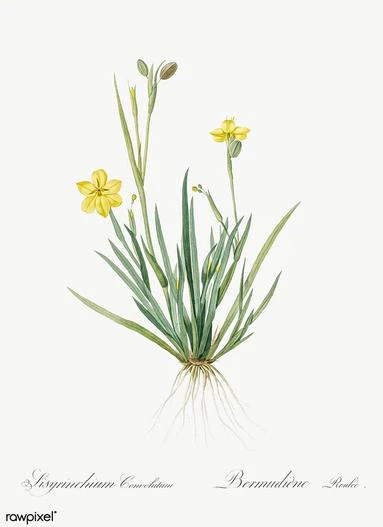Golden Blue-Eyed Grass
(Sisyrinchium convolutum)
Golden Blue-Eyed Grass (Sisyrinchium convolutum)
/
/

Free Public Domain Illustrations by rawpixel
CC BY 2.0
Image By:
Free Public Domain Illustrations by rawpixel
Recorded By:
Copyright:
CC BY 2.0
Copyright Notice:
Photo by: Free Public Domain Illustrations by rawpixel | License Type: CC BY 2.0 | License URL: https://creativecommons.org/licenses/by/2.0/ | Uploader: Free Public Domain Illustrations by rawpixel | Publisher: Flickr

Estimated Native Range
Climate Requirements for Glen Cove, New York
| This Plant | Your Site | Plant Suitability for Your Location | ||
|---|---|---|---|---|
| • Precipitation | 38" - 67" | 44" | Aquatic | Aquatic |
| • High Temp. | 63°F - 91°F | 83°F | Your summer temperatures are normal for this plant. | Excellent |
| • Low Temp. | 34°F - 55°F | 23°F | Your winter temperatures are normal for this plant | Excellent |
This plant should grow very well at your location without additional irrigation.
Summary
Sisyrinchium convolutum, commonly known as Golden Blue-Eyed Grass, is a semi-deciduous perennial herb native to open grasslands and meadows from Mexico to Peru. This plant typically grows to a height of 0.5-0.7 feet (0.15-0.2 meters) and spreads 1-2 feet (0.3-0.6 meters) wide. It forms clumps of narrow, grass-like leaves and bears bright yellow star-shaped flowers with six petal-like tepals during the summer and fall months. The flowers are moderately showy and attract pollinators.
Golden Blue-Eyed Grass is valued for its vibrant flowers and ability to fill in as a ground cover in garden settings. It is often used in rock gardens, borders, and as an accent in mixed perennial beds. This plant is relatively low-maintenance, requiring only occasional deadheading to promote continued blooming. It prefers full sun to part shade and requires well-drained soil with moderate moisture. While it is not known for serious pest or disease problems, it can suffer from root rot if overwatered or planted in poorly drained soils. Golden Blue-Eyed Grass is not typically invasive but can self-seed if conditions are favorable.CC BY-SA 4.0
Golden Blue-Eyed Grass is valued for its vibrant flowers and ability to fill in as a ground cover in garden settings. It is often used in rock gardens, borders, and as an accent in mixed perennial beds. This plant is relatively low-maintenance, requiring only occasional deadheading to promote continued blooming. It prefers full sun to part shade and requires well-drained soil with moderate moisture. While it is not known for serious pest or disease problems, it can suffer from root rot if overwatered or planted in poorly drained soils. Golden Blue-Eyed Grass is not typically invasive but can self-seed if conditions are favorable.CC BY-SA 4.0
Plant Description
- Plant Type: Herb
- Height: 0.5-0.7 feet
- Width: 1-2 feet
- Growth Rate: Moderate
- Flower Color: Yellow
- Flowering Season: Summer, Fall
- Leaf Retention: Semi-Deciduous
Growth Requirements
- Sun: Full Sun, Part Shade
- Water: Medium
- Drainage: Medium, Fast
Common Uses
Bee Garden, Bird Garden, Butterfly Garden, Deer Resistant, Low Maintenance, Rabbit Resistant, Rock Garden, Showy Flowers
Natural Habitat
Native to open grasslands and meadows from Mexico to Peru
Other Names
Common Names: Yellow-Eyed Grass, Yellow Eyed Grass
Scientific Names: Sisyrinchium convolutum, Sisyrinchium guatemalense, Bermudiana convoluta, Echthronema convoluta, Marica convoluta, Sisyrinchium alatum var. guatemalense, Sisyrinchium luteum, Sisyrinchium vesiculatum
GBIF Accepted Name: Sisyrinchium convolutum Nocca